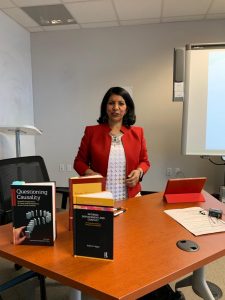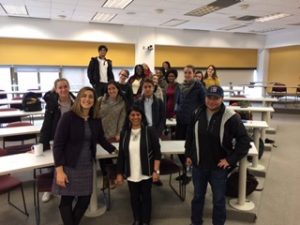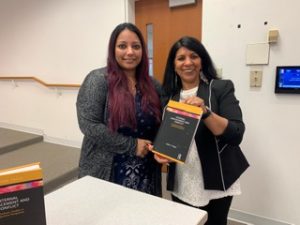Last week I attended an intriguing panel discussion hosted by Brookings, with Nigeria at its focus.
There is a proposal among the ECOWAS countries (Economic Community of West African States) to introduce a common currency, as a mechanism to promote stability to that part of the region. The common currency will be called ECO. They suspect that Nigeria would be a big player in the monetary policy-making and could be like the ‘Germany in the context of Euro’, governing regulations, setting monetary-policy etc.
I never thought of Nigeria to be that influential a player in the region. I still think of Nigeria as a poor country and yet oil rich, just as I did when I worked for Nigeria spending a decade on agriculture development in Nigeria.
Aug 05
Proposal for Common Currency for ECOWAS countries
Jan 15
Central African Republic (CAR) Refugees fleeing double in a week to 60,000
Geneva (AFP)
The number of refugees fleeing violence following last month’s contested presidential election in the Central African Republic has doubled in a week to 60,000, the United Nations said Friday.
The UN refugee agency UNHCR said more than 50,000 of those had fled across the Ubangui River to the Democratic Republic of Congo — with 10,000 people arriving in the DRC on Wednesday alone as rebels attacked near the CAR capital Bangui.
“The UN Refugee Agency is calling for the immediate end to all violence in the CAR as nearly 60,000 people have been forced to seek refuge in neighbouring countries since December, a two-fold rise in just one week,” UNHCR spokesman Boris Cheshirkov told reporters in Geneva.
He said that besides those crossing into the DRC, nearly 9,000 CAR refugees had arrived in neighbouring Cameroon, Chad and the Republic of Congo in the past month — while a further 58,000 people were still internally displaced within the CAR.
“UNHCR and partners in CAR are gathering reports of abuses by armed groups, including of sexual violence, attacks on voters and pillaging,” Cheshirkov said.
“UNHCR is calling for an immediate return of all parties to meaningful dialogue and progress towards peace. The events of the last month — since reports of election-related violence began — reverse the trend of recent years of Central African refugees returning home.”
– Attack near capital –
Landlocked CAR is one of the world’s poorest nations and has seen a string of coups and wars since it gained independence from France in 1960.
On Wednesday, rebel forces in the CAR mounted their closest attack yet to Bangui — which lies on the Ubangui across from the DRC — before being pushed back with the loss of a peacekeeper, the UN said.
Rebels launched an offensive vowing to march on the capital ahead of the contested December 27 presidential election, in what the government has called an attempted coup.
On January 4, President Faustin Archange Touadera was declared victor of the ballot, although the CAR’s political opposition cried foul.
The results account for only about half of registered voters, as hundreds of thousands were unable to cast their vote in areas held by rebels.
The Refugee Agency said it was already seeking $151.5 million this year to respond to the situation in the CAR.
However, given the needs of those fleeing their homes, UNHCR expects it will soon face a substantial shortfall, and called on the international community to expand its support.
“UNHCR and its partners are scaling up assistance for the new arrivals, despite poor infrastructure hampering the humanitarian response,” said Cheshirkov.
https://www.france24.com/en/live-news/20210115-refugees-fleeing-c-africa-double-in-a-week-to-60-000-un
Jul 18
Impact of COVID-19 on Displaced Populations
II. Impact on Refugee and other Displaced Communities
Around the world, more than 70 million people live in displacement as, refugees, Internally Displaced Persons (IDPs), stateless persons, or as asylum seekers (Rajput, 2019). Most often the displaced live in fear of violence, starvation and with compromised immune systems. Even under normal conditions, these persons live in cramped spaces, without access to running water, soap or medical facilities. The survival of these communities is largely dependent on humanitarian groups, who in the midst of COVID-19 have had to determine how to adjust their operations in light of restrictions placed on them, in order to limit the spread of the virus. Although most governments consider the lifesaving humanitarian operations as ‘essential services’ however, not all groups have the resources to operate in this unprecedented public health crisis. Complying with ‘physical distancing’ now a universally prescribed preventive measure, has restricted the operations of many humanitarian groups and many have shut down, leaving a gap in the services that the displaced have come to rely on for daily survival. With non-essential workers required to stay home, public services strained, resources diverted, and charities operating at reduced capacity, displaced persons have become more vulnerable. Many have lost access to income, the rented space and food. The World Bank has cautioned the world of a sharp decline in growth and it estimates that as many as ‘71 million people may slip into extreme poverty’ (World Bank, 2020). The United States Institute of Peace (USIP, 2020) suggests that the densely populated communities in South Asia [and elsewhere] located in economically deprived outskirts have complicated the response to this pandemic and have ‘exacerbated societal fractures and structural problems, including religious, caste, ethnic divisions’ and issue of minority communities, given the ineffective communication and the pre-COVID-19 tensions.
Medical guidance, in response to COVID-19, such as ‘shelter-in place’ ‘social distancing’, ‘frequent hand-washing’ and ‘sanitizing the surroundings’ have become taxing for the people, who have no space, water, soap, or sanitizing supplies. The former Pakistan’s Ambassador to the United States, Ambassador Maleeha Lodhi, suggests that the ‘distancing’ may not only be a challenge for those in the displacement camps, but rather a ‘challenge of the developing countries’ (Lodhi, 2020). However, as is clear from the spectrum of public figures and others who have become victims of COVID-19, such as positive testing of England’s Prince Charles, Hollywood celebrities, journalists, priests, teachers, doctors and nurses; the overall threat of this virus does not recognize borders of geography, political affiliation, race, age, gender, or a person’s migration status.
In responding to COVID-19 pandemic, many nations have taken harsh measures against, refugees and migrant workers. These have included border closures, wire-fencing of the refugee camps, expulsions, lock-downs of migrant communities, stoppage of internet connections and the confiscation of SIM cards used for mobile phone. These communities have also been excluded from programs adopted by the countries to secure the health and economic well-being of their own citizens. Actions taken by countries, to control and prevent the spread of the virus have ignored the international human rights norms. The right to health and information, and non-return of refugees to areas with threat of persecution apply to all refugees and at all times.
However, many governments, such as the Colombian government and others have made sincere efforts to include their refugee population in the country’s pandemic response, such as the right to testing and the treatment for those who test COVID-19 positive. Nevertheless, the virus has overwhelmed even some of the most well-developed health systems in the world and has in particular taxed the hosting nations that had already lacked the capacity to address the daily needs of the displaced communities within their borders.
The following section details the specific response to COVID-19 virus undertaken by several nations as it impacts the displaced communities.
Dec 19
Internal Displacement and Conflict: Kashmiri Pandits in Comparative Perspective
Just wrapped up another great semester of teaching at George Washington University (Fall 2019). This time it was cool to be the Professor with her own book teaching international policies for Refugee and Migrant Crisis. GWU students amaze me, very bright and engaged.
https://www.amazon.com/s/ref=nb_sb_noss?url=search-alias%3Daps&field-keywords=sudha+rajput
Jun 20
World Refugee Day – some thougths
World Refugee Day: June 20, 2019
This day should be of concern to all of us, as it is a reminder that the issue of refugees, stateless people, asylum seekers and those who remain internally displaced within their countries continue to pose survival challenges for almost 70 million people of our world.
Regardless of the circumstances responsible for the displacement of people, and the opportunities afforded to them while in displacement, returning home remains the key aspiration for most of those displaced.
Integration into host societies, while a humane goal, remains far from satisfactory for the displaced. Once displaced, all dimensions of a human being; mental, physical, social, economic, political and legal become distorted. The once lost identity, on the day of displacement, can only be regained by returning home.
On this World Refugee Day, let’s hope that more effort can be extended to the issue of return than to the making of more refugee camps, collective centers, settlements, shelters, and migrant townships.
My recently published book: Internal Displacement and Conflict: The Kashmiri Pandits in Comparative Perspective elaborates on the meaning of return for those displaced from Kashmir Valley, Nagorno-Karabakh, South Ossetia, Kosovo and Darfur.

https://www.routledge.com/Internal-Displacement-and-Conflict-The-Kashmiri-Pandits-in-Comparative/Rajput/p/book/9781138354265
Discount Code: SOC19
https://www.amazon.com/s/ref=nb_sb_noss?url=search-alias%3Daps&field-keywords=sudha+rajput
Apr 01
Book: Internal Displacement and Conflict
Book: Internal Displacement and Conflict: The Kashmiri Pandits in Comparative Perspective
Available through ROUTLEDGE (Publisher) at 20% discount, use the code SOC19.






Recent Comments